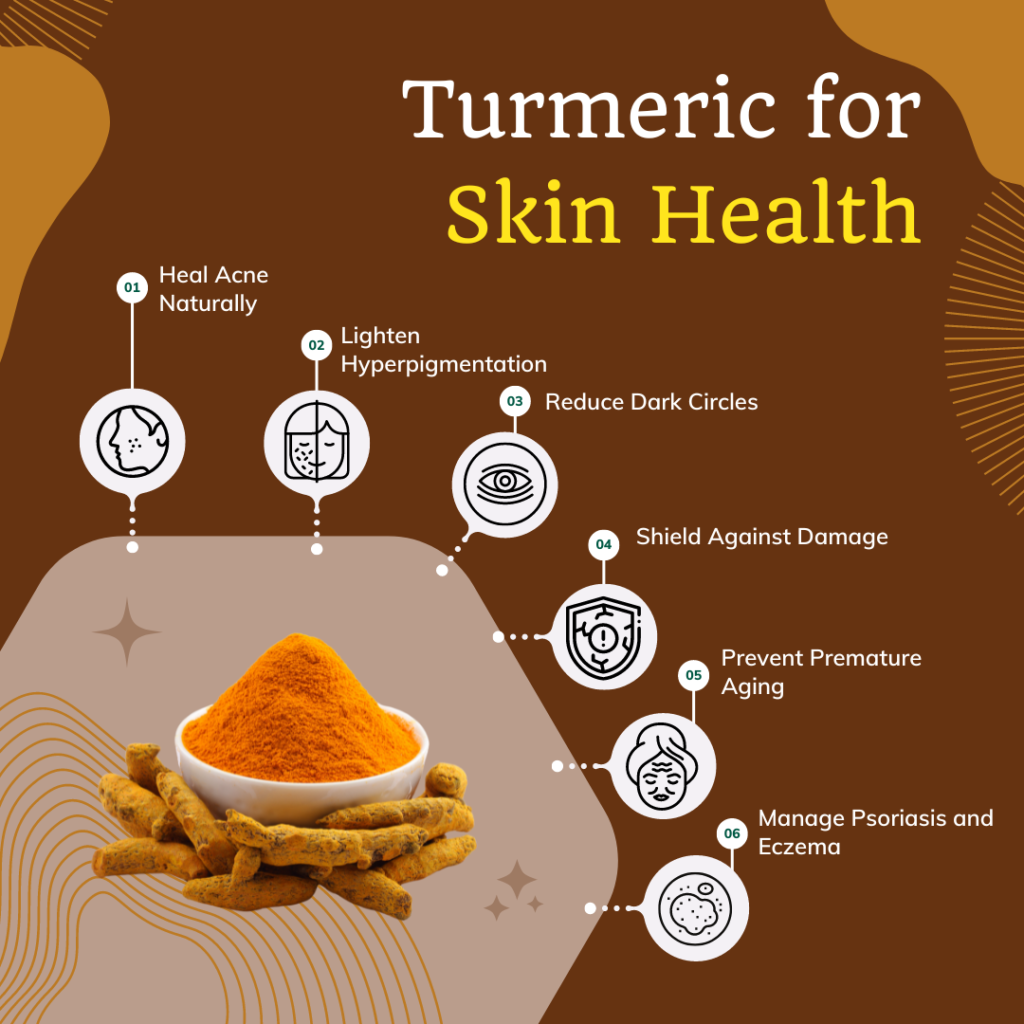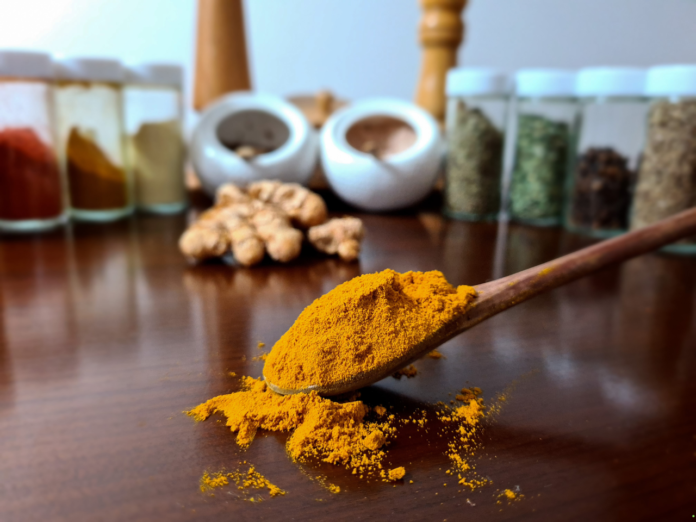Did you know that turmeric can improve your skin’s health in multiple ways? This golden spice is packed with antioxidants and anti-inflammatory properties. It helps reduce acne, brighten skin tone, and fight signs of aging. Turmeric benefits on the skin go beyond just aesthetics; it promotes healing and can even soothe conditions like eczema. You can naturally achieve a radiant complexion by incorporating turmeric into your skincare routine. Discover how this powerful ingredient can transform your skincare game and unlock its full potential for your skin.
Key Takeaways
-
Turmeric can improve skin health by reducing inflammation and promoting healing, making it a great addition to your skincare routine.
-
The protective properties of turmeric help shield the skin from damage caused by free radicals and UV exposure, enhancing overall skin appearance.
-
Always conduct a patch test before using turmeric on your skin to avoid potential allergic reactions or irritation.
-
Consider using turmeric in face masks or as a supplement to harness its benefits effectively without compromising skin safety.
-
Keep in mind that while turmeric is beneficial, it should be used in moderation to prevent any unwanted side effects.
-
Consult with a dermatologist if you have specific skin concerns or conditions before incorporating turmeric into your skincare regimen.
Turmeric for Skin Health

Heal Acne Naturally
Turmeric supplements have amazing benefits for your skin! One of the coolest things about turmeric is that it can help reduce the bacteria that cause acne. This means that if you have pesky pimples popping up, using products with turmeric in them could help clear things up. Not only does turmeric fight breakouts, but it also has a soothing effect on your skin. If you have redness or irritation, using a turmeric mask can help calm things down and make your skin look and feel better.
Another awesome benefit of using turmeric in your skincare routine is that it can help heal acne scars faster. So, if you’re dealing with leftover marks from past breakouts, incorporating turmeric into your routine could be a game-changer for you!
Lighten Hyperpigmentation
Turmeric is not just a super cool spice for your curry – it’s also a skin superhero! Adding turmeric application to your skincare routine can work wonders for your skin. Did you know that turmeric has natural antibacterial properties that can help fight acne-causing bacteria? It’s true! By incorporating products with turmeric into your daily regimen, you can effectively keep those pesky breakouts at bay. But wait, there’s more! If you’re struggling with inflamed skin or redness, using a turmeric mask can provide soothing relief.
The anti-inflammatory properties of turmeric can help calm down irritated skin and reduce redness, leaving your complexion looking and feeling more balanced. And here’s the cherry on top – turmeric can also assist in speeding up the healing process of acne scars. Regular application of turmeric-infused products can help fade those stubborn marks and promote overall skin rejuvenation. So the next time you’re thinking about revamping your skincare routine, don’t forget to consider incorporating turmeric application for a healthy and glowing complexion.
Reduce Dark Circles
Turmeric, a golden spice commonly found in kitchens, is not only great for adding flavor to dishes but also has amazing benefits for our skin! When turmeric is mixed with coconut oil to make a paste, it becomes a powerful remedy for reducing puffiness under the eyes. The anti-inflammatory properties of turmeric help to soothe the delicate skin around the eyes, while the moisturizing effects of coconut oil keep the skin hydrated and radiant.
By applying this turmeric paste regularly, you can gradually fade away those stubborn dark circles that make you look tired. Over time, you’ll notice a significant improvement in the appearance of your under-eye area, giving you a more refreshed and youthful look. So next time you’re looking for a natural solution to combat eye puffiness and dark circles, reach for that turmeric and coconut oil combo for brighter and healthier skin!
Shield Against Damage
Turmeric has strong antioxidant properties. These help protect the skin from environmental stressors like pollution and UV rays. Incorporating turmeric into daily skincare can strengthen the skin barrier. Using turmeric-based products helps neutralize free radicals that cause skin damage.
So, next time you’re looking for a simple way to keep your skin healthy and glowing, consider adding turmeric to your skincare routine!
Prevent Premature Aging
Turmeric stimulates collagen production. This ability helps maintain skin elasticity. Regular application of turmeric masks can reduce fine lines and wrinkles. Combining turmeric with other anti-aging ingredients boosts its effects. This combination improves overall skin appearance.
So, if you want your skin to look younger and smoother, using turmeric with other good stuff can help make your skin look awesome!
Manage Psoriasis and Eczema
Topical use of turmeric can soothe inflamed patches linked to psoriasis. Applying turmeric-infused creams alleviates itchiness and discomfort from eczema. Turmeric in skincare routines helps manage flare-ups effectively. Many people find relief when they include turmeric in their daily products.
If you have skin conditions like psoriasis or eczema, using turmeric can help calm redness and itching. Adding turmeric to your skincare routine might make a big difference in managing these issues.
Potential Risks and Considerations
While the benefits of turmeric on the skin are well-known, it’s important to take certain precautions to ensure its safe and effective use. Before incorporating turmeric into your skincare routine, conduct a patch test by applying it to a small area to check for any allergic reactions. For those with sensitive skin, diluting turmeric with carrier oils can help prevent irritation. It is essential to monitor your skin’s response to turmeric, and if you notice any redness or discomfort, discontinue use immediately.
In case of persistent symptoms, consulting a dermatologist is highly recommended. To enhance the effectiveness of turmeric in skincare, consider mixing it with other natural ingredients. Following the correct dosages and application frequencies will help you maximize the benefits while minimizing any risks. Lastly, ensure that your turmeric-based products are stored properly to maintain their potency and effectiveness for your skin.

-
Test turmeric on a small area of skin before widespread application.
-
Dilute turmeric with carrier oils for sensitive skin.
-
Monitor skin reactions when using turmeric in your skincare routine.
-
Conduct a patch test to identify allergic reactions.
-
Discontinue use if redness or irritation occurs.
-
Consult a dermatologist if allergic symptoms persist.
-
Mix turmeric with other ingredients for effective skincare formulations.
-
Follow recommended dosages and application frequencies.
-
Store turmeric products properly for potency and effectiveness.
Closing Thoughts
Turmeric is a caretaker for your skin, offering numerous benefits from its protective properties to potential healing effects. You can harness its natural goodness for a healthier complexion. However, be mindful of the risks and always do a patch test before diving in. Your skin deserves the best care, and knowing how to safely incorporate turmeric is key.
Consider adding turmeric to your skincare routine for a radiant glow. Whether through DIY masks or supplements, the choice is yours. Embrace this golden spice and unlock its potential for your skin health. Stay informed and empowered—your skin will thank you!
Frequently Asked Questions
What are the main benefits of turmeric for the skin?
Turmeric offers anti-inflammatory, antioxidant, and antibacterial properties. It helps reduce acne, brighten skin tone, and soothe irritation, promoting a healthier complexion.
How can I use turmeric on my skin?
You can apply turmeric as a mask by mixing it with yogurt or honey. Alternatively, look for skincare products containing turmeric extract for easier application.
Are there any side effects of using turmeric on the skin?
e people may experience allergic reactions or irritation. Always conduct a patch test before applying turmeric to larger areas of your skin.
Can turmeric help with acne scars?
Yes, turmeric can help lighten acne scars due to its anti-inflammatory and healing properties. Regular application may improve skin texture over time.
How often should I use turmeric on my skin?
Using turmeric 1-2 times a week is generally effective. Overuse may lead to staining or irritation, so moderation is key.
Is turmeric safe for all skin types?
While most skin types tolerate turmeric well, those with sensitive skin should be cautious. It’s best to consult a dermatologist if you have concerns.
Can pregnant women use turmeric on their skin?
Topical use of turmeric is generally considered safe during pregnancy. However, it’s advisable to consult a healthcare provider for personalized advice.



